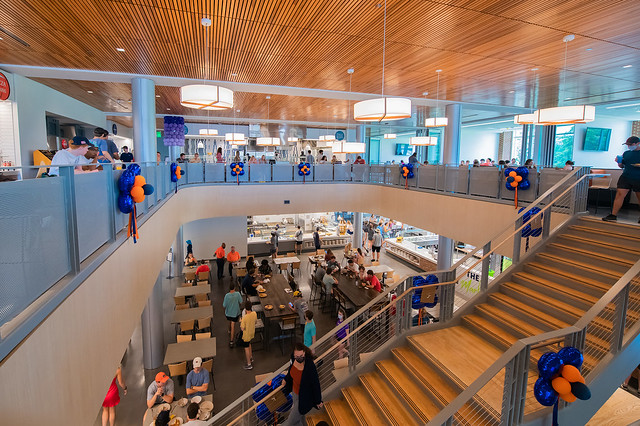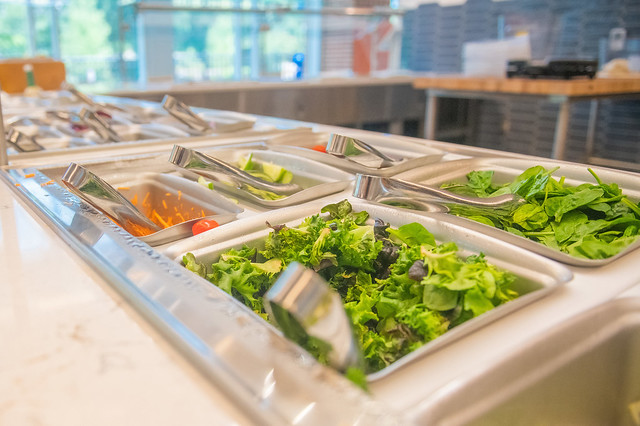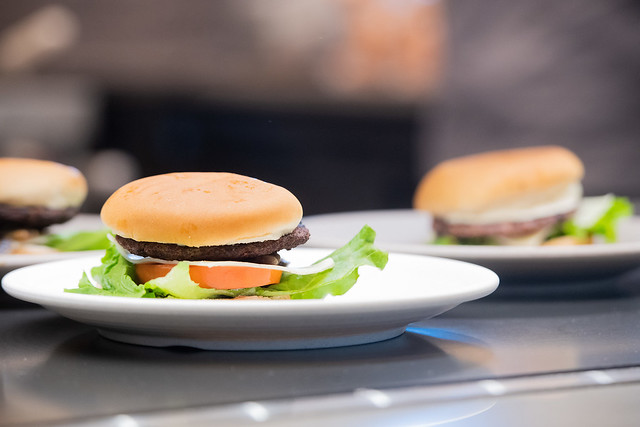Auburn’s new ‘The Edge at Central Dining’ features homegrown food from College of Agriculture
Article body
Auburn University students have a new dining facility, The Edge at Central Dining, with literally homegrown food from the College of Agriculture, from salads with fresh tomatoes and lettuce to fish and burgers, and more.
“We recently completed the construction and have already started serving,” said Director of Dining and Concessions Glenn Loughridge. “The Edge has nine different food stations, including one with allergen-sensitive recipes, and it features products grown on campus.”
The $26 million, 48,000-square-foot facility has 800 seats, as well as dining/study rooms that can be reserved by faculty, staff or students. The two-level building is located between Jordan-Hare Stadium and the Academic Classroom and Laboratory Complex scheduled to open in the spring.
“The Edge is remarkable,” said Auburn junior Brady Natoli, who toured the facility this summer. “I’m looking forward to eating there, and I believe students will appreciate the Auburn-produced selections.”
Loughridge and Daniel Wells, associate professor of horticulture, first initiated a partnership between the College of Agriculture and Campus Dining five years ago through an aquaponics project, which uses hydroponics and aquaculture technologies to provide a system in which nutrient-laden wastewater from fish production is used as a food source for plant growth, such as tomatoes, cucumbers and lettuce. The Tilapia from the system are harvested and served fresh in dining facilities on the Auburn campus as well.
This summer the collaboration expanded as the College of Agriculture opened two new self-contained “vertical farms” that build on the aquaponics effort. These are shipping containers that have been converted into technologically advanced hydroponic growing stations in which plants grow vertically indoors without soil, getting their nutrition from water and light energy from powerful LEDs.
“These partnerships are great for our Ag students and for students in general at Auburn,” said Desmond Layne, head of the Department of Horticulture. “We are using state-of-the-art processes that provide food in a sustainable manner.”
Loughridge says the vertical farms will allow new approaches to providing food on campus.
“We've had the aquaponics partnership for a few years now, in which we’ve been specializing in romaine lettuce, tomatoes and cucumbers. Now, the vertical farms will concentrate on growing different types of leafy greens, while aquaponics will specialize in cucumbers, peppers and tomatoes. We have a great partnership with the meats lab, too, providing much of our hamburger meat.”
Sustainability and working to eliminate food insecurity are also major goals of Dining’s partnerships. Food products that are prepared but not served in campus dining halls are donated to Campus Kitchens, which provides food to the less fortunate in the community.
“Campus Kitchens received over 50,000 pounds of food in 2019 and served 53,000 meals, so that's a huge win for the city of Auburn and the university,” Loughridge added. “We are proud to be able to contribute to these amazing student efforts to fight food insecurity in our community.”
Plans are in the works for a state-of-the-art composting system that will divert both pre- and post-consumer food waste away from landfills and turn it into rich soil that can be used to grow more food.
The Edge is open to students, faculty, staff and the public seven days a week from 7 a.m. until 10 p.m. each day, including gamedays. More information is available on the website.
Related Media
Media interested in this story can contact Communications Director Preston Sparks at (334) 844-9999 or preston.sparks@auburn.edu.
Auburn University is a nationally ranked land grant institution recognized for its commitment to world-class scholarship, interdisciplinary research with an elite, top-tier Carnegie R1 classification, life-changing outreach with Carnegie’s Community Engagement designation and an undergraduate education experience second to none. Auburn is home to more than 30,000 students, and its faculty and research partners collaborate to develop and deliver meaningful scholarship, science and technology-based advancements that meet pressing regional, national and global needs. Auburn’s commitment to active student engagement, professional success and public/private partnership drives a growing reputation for outreach and extension that delivers broad economic, health and societal impact.










